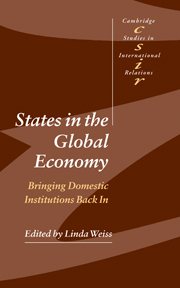Book contents
- Frontmatter
- Contents
- List of figures
- List of tables
- List of contributors
- Preface
- 1 Introduction: bringing domestic institutions back in
- Part I The resilience of welfare states
- Part II New economic challenges, changing state capacities
- 5 France: a new ‘capitalism of voice’?
- 6 The challenges of economic upgrading in liberalising Thailand
- 7 Building institutional capacity for China's new economic opening
- 8 New regimes, new capacities: the politics of telecommunications nationalisation and liberalisation
- 9 Ideas, institutions, and interests in the shaping of telecommunications reform: Japan and the US
- 10 Diverse paths towards ‘the right institutions’: law, the state, and economic reform in East Asia
- Part III Governing globalisation
- List of references
- Index
- CAMBRIDGE STUDIES IN INTERNATIONAL RELATIONS
5 - France: a new ‘capitalism of voice’?
Published online by Cambridge University Press: 22 September 2009
- Frontmatter
- Contents
- List of figures
- List of tables
- List of contributors
- Preface
- 1 Introduction: bringing domestic institutions back in
- Part I The resilience of welfare states
- Part II New economic challenges, changing state capacities
- 5 France: a new ‘capitalism of voice’?
- 6 The challenges of economic upgrading in liberalising Thailand
- 7 Building institutional capacity for China's new economic opening
- 8 New regimes, new capacities: the politics of telecommunications nationalisation and liberalisation
- 9 Ideas, institutions, and interests in the shaping of telecommunications reform: Japan and the US
- 10 Diverse paths towards ‘the right institutions’: law, the state, and economic reform in East Asia
- Part III Governing globalisation
- List of references
- Index
- CAMBRIDGE STUDIES IN INTERNATIONAL RELATIONS
Summary
Recent scholarship has documented the resistance of national economic institutions to the forces of globalisation (see, e.g., Berger and Dore 1996). But resistance has not always been appreciable among national financial institutions. Several Western European countries have experienced some form of ‘Big Bang’ financial liberalisation. France, once the European representative of state-led developmentalism, has shown greater liberalising zeal than other European countries, and looks today like the poster child of global financial capitalism. But French liberalisation has had its limits. I focus on those limits here, not to contest the obvious, but to inform discussion regarding the room to move accorded to states under conditions of globalisation.
I articulate the examination of financial reform in France around three themes, a structural one, a more sociological one, and finally, a speculative one. The structural theme inquires into the usefulness of the opposition between state power and market power. The structural constraint that contributed most significantly to reform in France did not oppose a Colbertist state and a global market. Rather it opposed a large country, the United States, and a smaller (small, that is, in the sense of price-taker), more trade-dependent country, France. French vulnerability to the vagaries of US policy supplied the principal motivation behind French reforms. France's interest in European integration today is fed to a considerable degree by the desire to diminish the force of that structural constraint. Because I develop this theme elsewhere, I offer only a summary here, and a response to critics.
- Type
- Chapter
- Information
- States in the Global EconomyBringing Domestic Institutions Back In, pp. 101 - 120Publisher: Cambridge University PressPrint publication year: 2003
- 11
- Cited by

